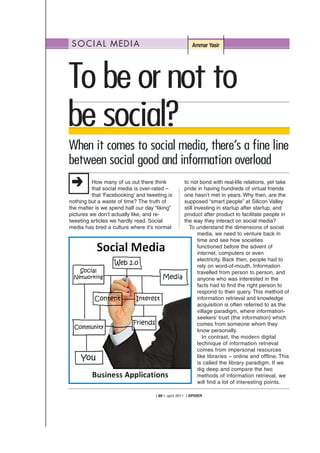
To be or not to be social
- 1. S O C I AL M E D I A Ammar Yasir To be or not to be social? When it comes to social media, there’s a fine line between social good and information overload How many of us out there think to not bond with real-life relations, yet take that social media is over-rated – pride in having hundreds of virtual friends that ‘Facebooking’ and tweeting is one hasn’t met in years. Why then, are the nothing but a waste of time? The truth of supposed “smart people” at Silicon Valley the matter is we spend half our day “liking” still investing in startup after startup, and pictures we don’t actually like, and re- product after product to facilitate people in tweeting articles we hardly read. Social the way they interact on social media? media has bred a culture where it’s normal To understand the dimensions of social media, we need to venture back in time and see how societies functioned before the advent of internet, computers or even electricity. Back then, people had to rely on word-of-mouth. Information travelled from person to person, and anyone who was interested in the facts had to find the right person to respond to their query. This method of information retrieval and knowledge acquisition is often referred to as the village paradigm, where information- seekers’ trust (the information) which comes from someone whom they know personally. In contrast, the modern digital technique of information retrieval comes from impersonal resources like libraries – online and offline. This is called the library paradigm. If we dig deep and compare the two methods of information retrieval, we will find a lot of interesting points. | 88 | april 2011 | SPIDER
- 2. SOCIAL MEDIA members of the community in real-time, and the authority’s reliability is based on one’s personal affiliation with it. Keeping these facts in mind, one must understand that though the human race is evolving technologically, it is sticking to the innate instinct of information retrieval. The difference is, with the additional layer of For library-supported instance, in knowledge base, the library paradigm, information retrieval queries are made based on can be done in real- keywords (“new iPad specs”, “Android time, and be verified firmware download” etcetera). In this from multiple sources. instance, the knowledge base exists prior This scenario may have to making the query, whereas trust is built been perfect 10 years ago, but based on the authority and credibility of considering the current state of the ever- the content publisher (Tech Crunch, growing pile of data, one has the right to Gizmodo etcetera). complain about information overload. So is the village paradigm still relevant? Another issue is differentiating between The answer is a resounding “Yes”. It is the useful data and all the existing white useful for retrieving information in real- noise – a task that is anything but easy. time, real-life situations, like for a traffic Of course, with technology, one has to be update or the law and order situation. In patient; it always eventually catches up this case, queries are answered by with people’s demands. Location-based Fans of location-based social networks (LBSNs) agree that these tools have great potential to succeed on both commercial and humanitarian grounds. This is exactly why the initial success of Foursquare forced social media giant Facebook to jump on the LBSN bandwagon, with its product Facebook Places. Initially, all that Foursquare offered was a game, based on the number of times a user publicly checked into his favourite places. Fast-forward a couple of months and truckloads of success across the globe, Foursquare evolved into a network that could recommend users to check out bookshops, restaurants, coffee shops etcetera, based on their interests and needs. Similarly, online deal broker Groupon offers shopping deals via social media, earning significant profits for Groupon and its clients. Rumour has it that a similar product is in the pipeline in Pakistan. We must also open our eyes to the humanitarian benefits of social networking, with projects like Ushahidi, an open-source platform used to collect information. It has also been used for interactive mapping and visualisation during many recent global crises. Even in Pakistan, Ushahidi came in handy during rehabilitation and rescue efforts for the flood survivors. Following Japan’s recent incidents of a devastating earthquake, tsunami and nuclear power plant meltdown, technology giants like Google, Apple, Microsoft and Twitter assisted in rescue efforts, by providing their platforms for the greater good. Google’s Person Finder is one example. Taking into consideration, the growing acceptance of social media in our society, and the progress of telecommunications, it is time we plan a future where we can build or customise existing platforms to take advantage of our understanding of the library and village paradigms | 89 | april 2011 | SPIDER